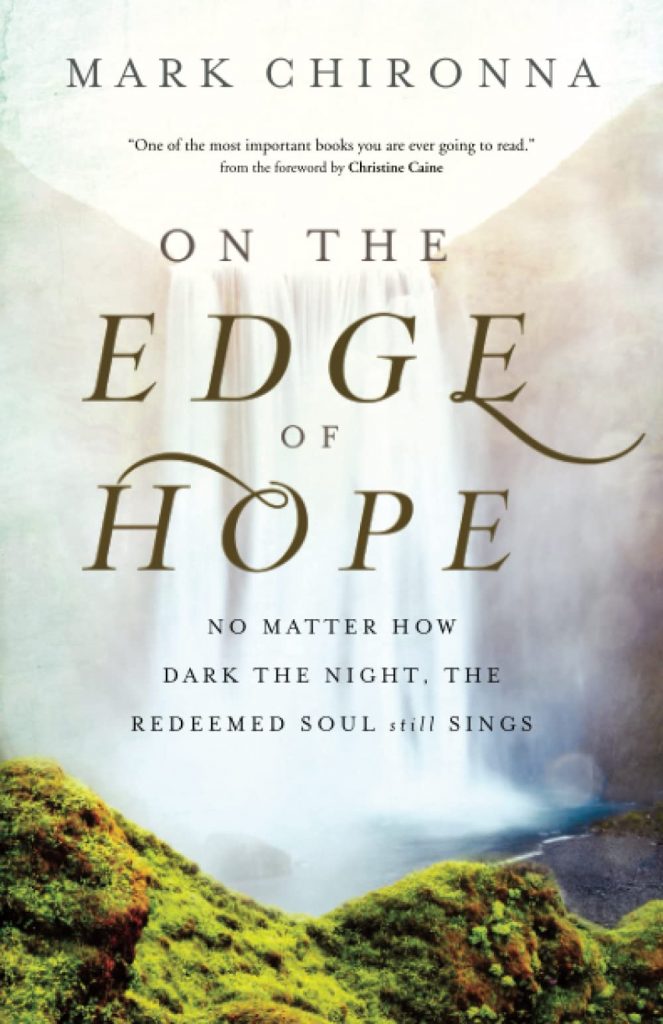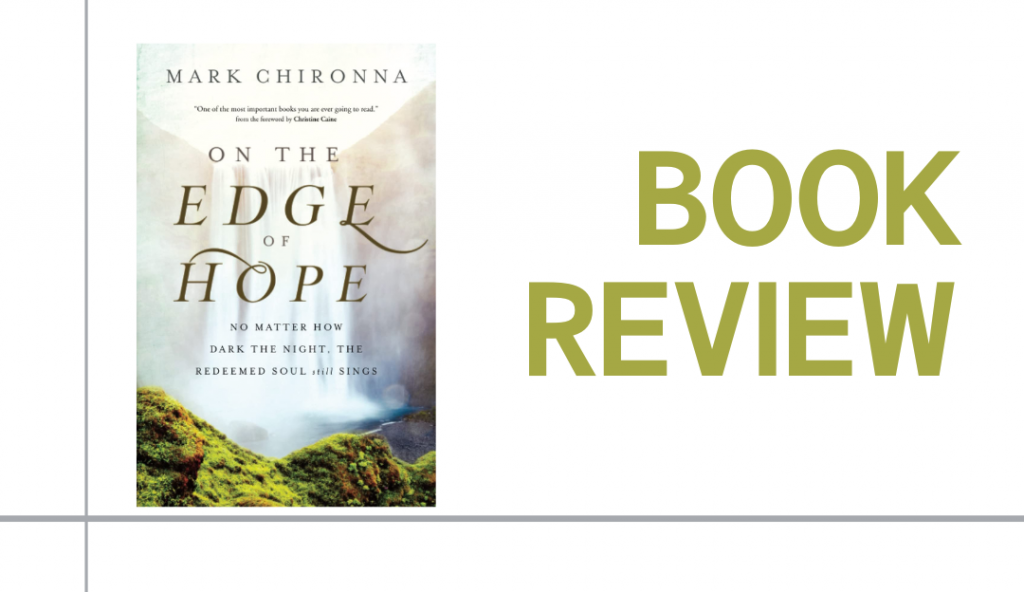On the Edge of Hope by Mark Chironna integrates theology and Christ-centered psychology to offer hope for those struggling with anxiety, depression, and pain.
Even though I’m unfamiliar with the author/pastor, the title of this book caught my attention and I knew I wanted to read it. Chironna’s writing is vulnerable and honest. I found myself nodding in agreement with the hard-learned wisdom he shares.

We all want easy answers and quick fixes so we can move past anxiety and pain as fast as we can. But the road to healing is complex and requires learning and “grunt work.” In this book, Chironna takes you along his journey of finding hope in God through the dark season he walked through.
The author’s experience as a pastor and his degrees in theology and psychology give credence to his writing and helped me understand how healing involves the body, mind, and soul.
Chironna encourages self-awareness so we can recognize how habitual ways of observing and interpreting the world can hinder growth. I loved how he shared personal examples as he navigated how his upbringing and life experiences affected his view of the world.
“It was painful for me to admit that I was dealing with anxiety and depression. And it was even more painful to accept that I could not fix it myself or speed up the healing process, no matter how hard I tried. Once I came to terms with those realities, I began to discover how deep-seated certain negative beliefs and assumptions were in me, beliefs and assumptions that needed to be removed. That was painful, too. But I was finally seeing myself clearly, and I was grateful for that. Sooner or later we must face our issues squarely. We cannot do that without self-awareness.”
“At times our minds are minefields filled with cognitive distortions, generalizations, willful gaps in knowledge, and areas of blind deletions resulting from our refusal to see what we need to see.”
“God is ever patiently at work to heal us, taking all the necessary time to free us from the primal fears that wreck our lives. Jesus, by the Spirit and on the Father’s behalf, continually works in us to strip away every mask of shame and false pretense. He is delivering us from the fear of rejection and invisibility, and He labors to bring us face-to-face with His glorious Father, in whom there is no shadow of turning.”
I thought Chironna gave a thorough explanation of how our thoughts influence our feelings, while also acknowledging how Satan affects our thoughts.
“The enemy works on us by affecting our thinking, and we’re most vulnerable when we’re aware that he works this way. So it’s important to remember that all our thoughts “come” to us. Discerning where they come from matters immensely. Not all our thoughts come from us; some come from our heart and others don’t. These other thoughts “come” in a similar fashion to the thoughts of the heart, yet they are sourced in our enemy’s lies, planted in our minds by the evil one.”
But the fact that we must evaluate what’s influencing our thoughts, doesn’t mean our emotions are bad. I appreciated how the author sorted through some teaching in the church that perpetuates negative beliefs and assumptions about feelings. Our emotions are God-given and meant to inform us. Our bodies inform us by reacting to stress.
“Sermons that warn us against trusting our feelings encourage us to dismiss our feelings as irrelevant. But not listening to our bodies means dismissing one of the truths’ most trustworthy witnesses. Often, our bodies try to tell us how stressed we are, how overworked we are, how frustrated we are, how angry we are, how burned out we are, and how tired we are. To ignore those messages is to ignore the voice of truth—the voice of the Spirit that calls us toward life.”
I enjoyed reading every chapter in this book. I love learning about how God created our minds to work because it helps me understand how to work through anxiety and sort through my complicated thoughts and emotions so I can train them to think upon truth instead of lies.
I received a free copy of this book from the publisher in exchange for an honest review.













 Hello there! I'm Valerie, a mom of four and wife of 27 years. My writing inspires others to cultivate courageous faith and find solace in trusting God, especially in moments of fear and uncertainty. Join me on this adventure as we explore the beauty of trusting God when we are afraid.
Hello there! I'm Valerie, a mom of four and wife of 27 years. My writing inspires others to cultivate courageous faith and find solace in trusting God, especially in moments of fear and uncertainty. Join me on this adventure as we explore the beauty of trusting God when we are afraid. 




I love books that link psychology and faith! This looks like a fantastic read! Thanks so much for sharing! I’m coming back to soak in these thoughts. I’m compelled by the part about the ways we don’t even realize how destructive our thought patterns can be!
The book mentions some cognitive distortions I’ve been learning about; for example, generalizing, all-or-nothing thinking, and personalization. It’s been helpful for me to become aware of the types of negative thinking patterns in order to take them captive. Thank you for reading my book review and taking the time to comment.